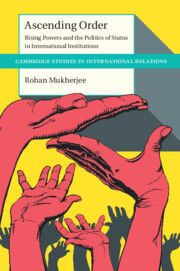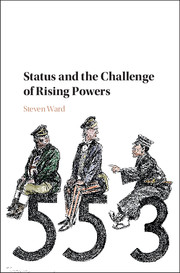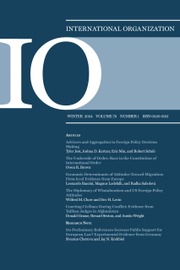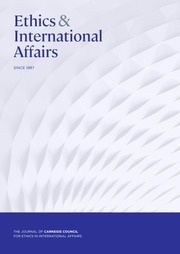Ascending Order
Rising Powers and the Politics of Status in International Institutions
$34.99 (F)
Part of Cambridge Studies in International Relations
- Author: Rohan Mukherjee, London School of Economics and Political Science
- Date Published: July 2023
- availability: Available
- format: Paperback
- isbn: 9781009186797
$
34.99
(F)
Paperback
Other available formats:
Hardback, eBook
Looking for an examination copy?
If you are interested in the title for your course we can consider offering an examination copy. To register your interest please contact [email protected] providing details of the course you are teaching.
-
Why do rising powers sometimes challenge an international order that enables their growth, and at other times support an order that constrains them? Ascending Order offers the first comprehensive study of conflict and cooperation as new powers join the global arena. International institutions shape the choices of rising states as they pursue equal status with established powers. Open membership rules and fair decision-making procedures facilitate equality and cooperation, while exclusion and unfairness frequently produce conflict. Using original and robust archival evidence, the book examines these dynamics in three cases: the United States and the maritime laws of war in the mid-nineteenth century; Japan and naval arms control in the interwar period; and India and nuclear non-proliferation in the Cold War. This study shows that the future of contemporary international order depends on the ability of international institutions to address the status ambitions of rising powers such as China and India.
Read more- Takes a multi-disciplinary approach, relying on insights from political science, economics, and social psychology
- Uses extensive archival and primary sources to reconstruct each case
- Readers will get a detailed feel for the extensive negotiations that took place between major powers in the international order at key historical junctures
Awards
- Winner, 2023 Hague Journal of Diplomacy Book Award
Reviews & endorsements
‘In a world in transition, Rohan Mukherjee helps us understand when rising powers are likely to challenge the world order or cooperate. In this path-breaking book, Mukherjee shows that the answer lies in overlooked areas - their place and status in international institutions - and the psychology of identity.’ Deborah Welch Larson, co-author of Quest for Status: Chinese and Russian Foreign Policy
See more reviews‘Ascending Order makes a real contribution to the literature on great power politics and the ways in which we can use institutions to shape the behavior of rising nations. Mukherjee’s analysis is clear and compelling, readily accessible for both scholars and practitioners. A timely and valuable read.’ Anne-Marie Slaughter, CEO, New America
‘Ascending Order is a timely and important contribution to international relations scholarship. Rohan Mukherjee moulds research on status concerns, rising powers, and international institutions into a novel theory that opens a new window on crucial but still poorly understood dimensions of great power politics. If you want to understand the substance underlying much of the talk about the ‘rules based order’ and ‘great power competition,’ read this book.’ William C. Wohlforth, Daniel Webster Professor, Department of Government, Dartmouth College
'The most dangerous moments in international affairs occur when rising states emerge to challenge the dominance of a reigning great power. In this excellent study, Mukherjee shows that these power transitions do not inevitably culminate in great-power conflict or hegemonic war.' G. John Ikenberry, Foreign Affairs
‘It is a theoretically ambitious and empirically jam-packed contribution that explains why rising powers in global politics sometimes challenge an international order that enables their growth, and at other times support an order that constrains them. The biggest strength of this book is indeed the breadth, depth, and novelty of the archival material, undoubtedly completed through extensive and meticulous labour.’ Caroline Dunton, Small States & Territories
‘Mukherjee provides helpful insights for nation-states and international organizations on how different institutional decisions can shape the behaviour of rising powers. In addition, the book will be of great value to researchers and practitioners as a starting-point for future research on the changing global order.’ Tobias Scholz, International Affairs
‘This book is an important work of both theory and historical analysis that hopefully will have a significant impact on current debates about the rise of China and the fate of the LIO. … Ascending Order has the potential to spark a deeper debate about the rise of China and the future of international order; a debate that is informed more by notions of justice, fairness, and legitimacy than by security concerns and the balance of military power.’ John G. Oates, Ethics & International Affairs
'Mukherjee provides an important analysis of how status and symbolic equality impact international relations. … Highly recommended.’ M. F. Cairo, Choice
‘… an outstanding book … Together with Mukherjee’s cogent writing style, the book’s timeliness and its contributions to the literatures on status, hierarchy, revisionism, and global governance make Ascending Order a must-read for otherwise disparate audiences.’ Review of International Organisations
‘… an outstanding book. Rohan Mukherjee’s first, it explains rising powers’ behavior with respect to the rules and institutions of the international order. To do so, Mukherjee articulates a novel theory that centers on rising powers’ pursuit of elevated status in the international society of states. Using a clever research design, Mukherjee presents three carefully researched historical cases that illustrate and arguably test the theory. The result is an excellent study that illuminates the changing institutional frameworks of distinctive international orders, explains how rising powers become dissatisfied with those orders, and traces over time the strategies they employ to move up the ranks of those orders, change them, or challenge them.’ Jonathan M. DiCicco, The Review of International Organizations
Customer reviews
Not yet reviewed
Be the first to review
Review was not posted due to profanity
×Product details
- Date Published: July 2023
- format: Paperback
- isbn: 9781009186797
- length: 351 pages
- dimensions: 229 x 152 x 19 mm
- weight: 0.509kg
- contains: 4 b/w illus. 11 tables
- availability: Available
Table of Contents
1. Introduction
2. Conceptual foundations
3. Institutional status theory
4. The United States and the Atlantic system in the 19th century
5. Japan and the Washington system of the interwar period
6. India and the international order of the cold war
7. China and the liberal international order
8. Conclusion.
Sorry, this resource is locked
Please register or sign in to request access. If you are having problems accessing these resources please email [email protected]
Register Sign in» Proceed
You are now leaving the Cambridge University Press website. Your eBook purchase and download will be completed by our partner www.ebooks.com. Please see the permission section of the www.ebooks.com catalogue page for details of the print & copy limits on our eBooks.
Continue ×Are you sure you want to delete your account?
This cannot be undone.
Thank you for your feedback which will help us improve our service.
If you requested a response, we will make sure to get back to you shortly.
×





